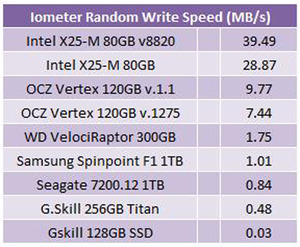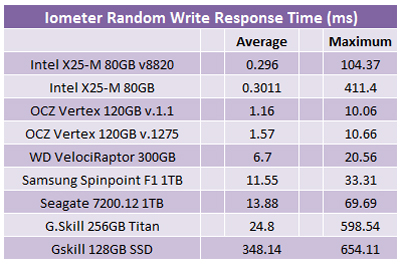
Iometer Results
Website: IometerIometer is a powerful open source synthetic benchmarking tool, able to simulate the effects of a wide variety of software loads and circumstances on either individual hard disk drives and complete drive arrays. In the past we've chosen not to include it due to bit-tech's traditional preference towards real world benchmarks. However, to correctly check for drive stutter caused by extremely high random write latencies there aren't a great deal of options, so we've finally decided to include Iometer in our hard disk testing suite.
For our Iometer testing we used a 4GB portion of the drive and subjected it to random read or write commands or both, depending on the test, of 4KB, with three outstanding I/Os to simulate high level multi-tasking. We ran this each test for two minutes, repeating three times to ensure we recorded an accurate result.
As the differences in read and write latencies and speeds can be so pronounced, we've also included tables of information where appropriate, to help make understanding the random read/write performance differences between different SSDs and conventional hard disk drives easier.
 While SSDs are all set up for blisteringly quick read speeds, both sequential and random, things get a bit more complicated when it comes to write speeds, especially when you start looking at random write. While the large bursts of sequential data we use in our real world FC-Test benchmarks are indicative of large file transfers, day to day operation is much more dependant on random writes.
While SSDs are all set up for blisteringly quick read speeds, both sequential and random, things get a bit more complicated when it comes to write speeds, especially when you start looking at random write. While the large bursts of sequential data we use in our real world FC-Test benchmarks are indicative of large file transfers, day to day operation is much more dependant on random writes. Consistently adding to log files, autosaving documents, accessing the registry and pagefile; these are all examples of random writes your operating system will perform without you ever knowing it, and it's emerged as the Achilles heel of many solid state drives, especially (although not limited to) those based on the JMicron's JMF 602 drive controller.
Just looking at the random write speeds above, it's clear just how much slower these drives are when it comes to random write speeds, and although the introduction of a second JMF 602 drive controller in the G.Skill Titan dramatically improved the situation, the result is still fifty percent slower than a decent mechanical drive - not what you'd expect for such a significant investment.
Conversely the Intel X25-M, based on Intel's own propitiatory drive controller is streets ahead, delivering a mighty random write speed at a huge 28.87 MB/s. However, during our testing we noticed that each time we repeated our random write test using the X25-M's latest firmware random write speeds halved and latencies doubled! This is obviously a critical problem and is at the heart of the issues users are experiencing with the X25-M, with performance degrading as the drive rewrites cells.
While the OCZ Vertex isn't able to field a random write speed result as impressive as the X25-M's, with the v1.1 firmware managing 9.97MB/s, it crucially doesn't suffer from the same kind of performance degradation over time. In fact, we ran our Iometer tests over twenty times on the drive, and performance was consistent throughout.
While the Vertex's random write speed might not be as impressive as those of the X25-M, it's still some ten times faster than the Samsung Spinpoint F1 1TB, and that's the crucial point, with the Vertex managing to not only massively outpace the mechanical hard disks, something non-Intel SSDs have as yet failed to do, but also able to do this constantly without performance degradation.
 Fast random write speed is nothing without low random write latencies though, and it's here especially where the JMicron drives have developed a bad name for themselves, tainted mostly by the first generation of single drive controller based drives which, as you can see from the results here, take on average 350ms to randomly write 4KB of data, and can in some places take up to 650ms! It's this behaviour that causes drive "stuttering," as the SSD struggles to keep up with the constant slew of random write commands from the OS and causes the operating system to visibly lag.
Fast random write speed is nothing without low random write latencies though, and it's here especially where the JMicron drives have developed a bad name for themselves, tainted mostly by the first generation of single drive controller based drives which, as you can see from the results here, take on average 350ms to randomly write 4KB of data, and can in some places take up to 650ms! It's this behaviour that causes drive "stuttering," as the SSD struggles to keep up with the constant slew of random write commands from the OS and causes the operating system to visibly lag.While the dual JMicron based G.Skill Titan greatly improved the situation,dropping average access times to just 25ms, it still lags behind conventional mechanical hard disk drives by some way, and offers worryingly high maximum latencies too.
Again it's the Intel X25-M that sits atop the heap when it comes to write latencies, with a ludicrously quick 0.3ms average response time and acceptable 104ms maximum using the latest firmware, a big improvement over the drive's original firmware where maximum write latencies approached half a second.
However the OCZ Vertex really shows its colours here, delivering both brilliantly low average and maximum random write latencies of just 1.16ms and 10.06ms respectively using the latest firmware. With such an excellent result there's no absolutely fear of OS stuttering caused by random write latencies, a fact made even more impressive by the OCZ Vertex's equally excellent sequential read and write speeds. We are officially impressed.

MSI MPG Velox 100R Chassis Review
October 14 2021 | 15:04








Want to comment? Please log in.